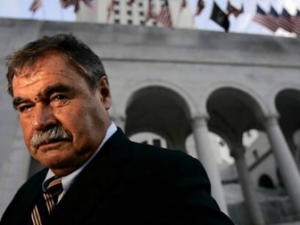When teacher and activist Sal Castro encouraged students in Los Angeles to protest what they saw as decades of substandard education for Mexican-American youths, he helped kicked off what was then the largest and most widespread civil rights movement by people of Mexican descent in the U.S.
Fifty-two years after the East L.A. Blowouts galvanized a new generation of activists, UC Santa Barbara will host the 5th Bi-Annual Sal Castro Memorial Conference. The event featuring 23 presenters from 18 colleges and universities will be held Friday, Feb. 28 and Saturday, Feb. 29 in the McCune Room on the sixth floor of campus’s Humanities and Social Sciences Building.
Organized by Mario T. García, a professor of Chicano and Chicana Studies at UC Santa Barbara, the conference theme is the emerging historiography of the Chicano Movement, reflecting what he calls “a renaissance of new historical research” on the movement.
The blowouts, García said, empowered Chicanos and made them national political actors for the first time and laid the foundation for a number of reforms and opportunities.
“However, in my opinion, the greatest advancement resulting from the movement was in access to better and higher education,” García said. “The movement pressured colleges and universities to recruit seriously for the first time Chicanos.”
Today, he noted, more than 500 universities nationwide, including UC Santa Barbara, are designated Hispanic Serving Institutions.
The early historiography, García noted, tended to focus on key sites of the movement, such as California and Texas, as well as male leaders, secular activism and a relatively narrow window — 1965 to 1975.
“The new historiography, by contrast, focuses much more on other sites of the movement such as smaller communities other than big cities such as Los Angeles,” he said. “In addition, it looks at the movement in a wider geographic way by studies of the movement in the Pacific Northwest and Midwest.”
As research on the movement has evolved, García said, so has the conference. In addition to historians, “the conferences have featured scholars in literature, art history, political science and communications who from their disciplinary focus are also part of this new historiography.”
Delivering the keynote address Friday at 11:15 a.m. are Anna NietoGomez, an independent scholar-activist, and Richard Martinez, a community activist.
NietoGomez was a key Chicana student leader at Long Beach State in the early 1970s. She organized early Chicana feminist organizations such as Hijas De Cuauhtémoc. She founded important Chicana feminist publications such as Hijas De Cuauhtémoc and Encuentro Femenil: A Chicana Feminist Journal. At Cal State Northridge she was one of the first Chicanas to teach in a Chicano Studies Department.
Martínez was a Chicano student leader during the Chicano Movement at Los Angeles City College. He was a founding member of Católicos Por La Raza, a Chicano Movement Catholic group organized to pressure the L.A. Archdiocese to do more for its Chicano parishioners. He worked with La Raza Magazine, the leading Chicano Movement publication in the country. He was also involved in the political campaigns of La Raza Unida Party, the third party established by the movement.
The conference will also pay a special tribute to the 50th anniversary of the Chicano Moratorium in East Los Angeles, when some 20,000 mostly Chicanos marched and protested against the U.S. war in Vietnam. Held Aug. 29, 1970, the Chicano Moratorium was the largest anti-Vietnam War protest by any minority group in the U.S. including African Americans.







